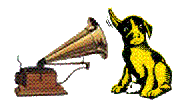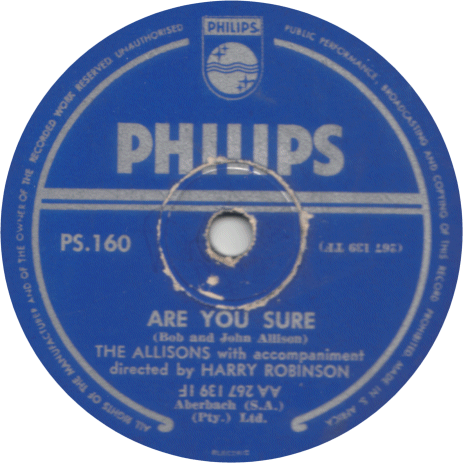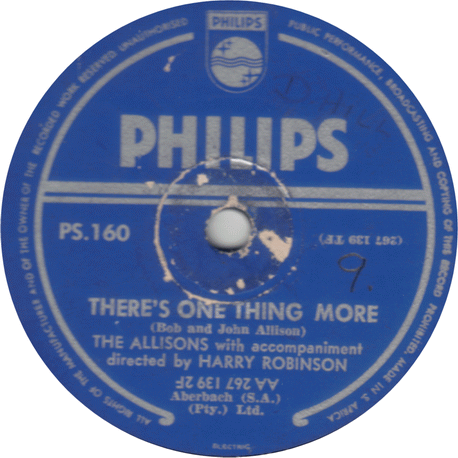
The Beatles
at 78 RPM
|
Cool 78 of the Month May 2006 |
|
The Allisons Are You Sure? Philips PS.160 (South Africa) Summer 1961 |

|
|
There is hardly a region of the world that has not been reached, some say infected, by the phenomena of the Idol franchise of television talent shows. From Pop Idol in the UK, American Idol in the USA, and Canadian Idol in Canada to Superstar KZ in Kazakhstan millions around the world cheer on their favourites every week. The mania that is these shows took the world by storm as a 21st century phenomena. But lurking behind the scenes, proudly marching on from its birth in 1955, is another international song and talent contest, the grandparent of them all, the Eurovision Song Contest. Simply known to all as Eurovision, the contest may not be a widely known as (your nation's name here) Idol, but it been a showcase for artists that eclipse any of the contemporary pretenders. While one would be hard pressed to find any knowledge of Malaysian Idol series one winner Jaclyn Victor outside of southeast Asia, the sound of the 1973 Eurovision winner Waterloo by ABBA is known around the world in places far removed from Sweden. All of this in spite of the fact that Eurovision is virtually unknown outside the airwaves around Europe. The contest has changed over the years and the participant base has grown to now include the former Soviet bloc nations. It began its days as a somewhat formal affair with orchestras being conducted by properly attired gentlemen only to transform into flashy high-energy affair complete with pyrotechnics. These changes occurred in direct response to the changes in pop music over the years. The safe sound of Sing Little Birdie by Pearl Carr and Teddy Johnson has been replaced by the thundering drums of Wild Dances by Ruslana. This brings us to the artists of our Cool 78 this month. Following along the red-hot success of the Everly Brothers, record companies were equally hot to sign up anything resembling two boys with guitars. The pool of talent was more than happy to supply the need giving us other brother groups such as the Kalin Twins in the USA and the Dowlands in the UK. So big was the appetite for the sound that the two guys didn't even have to be brothers to emulate the Everly sound. Like other teenagers in the 1950s Brian Alford came under the spell of the self-made sound of skiffle. Investing the sum of £2 in a guitar he learned his trade and was soon was cutting his teeth as half of a group called 'The Shadows Brothers' with John White. The boys were good in part due to Brian's songwriting abilities. So good in fact that in 1958, these two non-brothers appeared as hot discoveries on British TV. This brush with the big time did not lead to overnight success and The Shadows Brothers disintegrated into obscurity with John White bowing out. Brian soldiered on as a solo for a time before teaming up with church choir member Bernard Day. Adopting the surname Allison, Brian rechristened himself as John, Colin took the name Bob, and two brothers from different mothers were born. It was this change that got them noticed. They took off, besting a large field of competitors in a contest sponsored by the music newspaper DISC. Appearances on television gave them needed exposure and soon they snagged a contract with Fontana records in the UK. Pulling song from the newly named John Allison's past, they presented Fontana with the track Are You Sure. Fontana saw a winner in every way and pushed it as the UK entry in Eurovision. Less than two years into their mutual adoption as brothers, The Allisons took to the stage in Cannes, France. Disappointment haunted the boys as the jury awarded the top spot to Luxembourg's Jean-Claude Pascal with his entry Nous les Amoureux. Are You Sure came in a close second place. However, let it not be said that record buying public did not know talent. Are You Sure rocketed to number one all across Europe even beating its Eurovision competition in the charts. (Note: The Guinness Book of British Hit Singles shows it as number 2 as they use one of the few charts in which the song did not reach the top slot.) The boys went on to score two additional hits with diminishing returns, one of which, Lessons in Love being a cover of a song from the Cliff Richard film The Young Ones. With the beat era coming on, their careers also diminished. John and Bob occasionally reunite to help fans recall their golden era and their single LP release is highly prized. Virtually unknown to most fans is this rare 78 of their biggest hit. It was released on Philips in South Africa in the wake of their success during late spring 1961, doing well there. A 45 on London records (London 1971) in the USA was not so lucky. London did continue to promote them in the USA, but they remain known only to US fans of Eurovision and the Everly-style sound. Eurovision itself lives on to this day, and is either loved with manic proportions by its followers, or despised with venom by its detractors. While Eurovision releases on 78 from the 1950s, such as Nel Blu di Pinto di Blu by Dominico Modugno on Fonotipia from Italy, certainly exist, Eurovision related 78s from the 60s are another story. This release from the Allisons may be the latest 78 to emerge from the contest. It is certainly the coolest of all of them. |
|
B Side The Allisons There's One Thing More |

|
